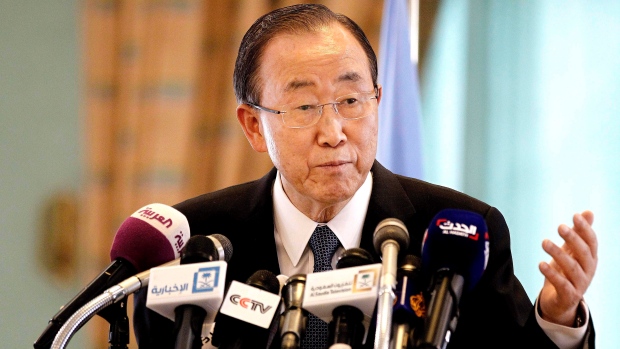 United Nations Secretary General Ban Ki-Moon speaks during a press conference with King Salman bin Abdul-Aziz Al Saud in Riyadh, Saudi Arabia on Feb. 8, 2015. (AP Photo)
United Nations Secretary General Ban Ki-Moon speaks during a press conference with King Salman bin Abdul-Aziz Al Saud in Riyadh, Saudi Arabia on Feb. 8, 2015. (AP Photo)
The Associated Press
The U.N. secretary-general says he is looking into ways that perpetrators of widespread human rights abuses in the South Sudan conflict can begin to be held accountable.
In his latest report released Thursday on the fighting that threatens the future of the world’s youngest country, Ban Ki-moon says he has asked his office to explore “options for the establishment of criminal accountability and transitional justice processes … to address the gravity and scope of the serious human rights atrocities committed in the country since the beginning of the crisis.”
He also called on the African Union’s security council to “urgently” consider a report which is expected to reveal those responsible for atrocities committed.
The AU has said it is postponing the release of its report so it won’t affect efforts toward a comprehensive agreement to end the crisis. Peace talks are expected to resume in neighbouring Ethiopia later this month.
Ban urged South Sudan President Salva Kiir and rebel leader Riek Machar to make the compromises necessary to end the fighting peacefully, saying they “can no longer hold the fate of the country hostage to their personal ambitions.”
Kiir’s office last week said the government is struggling with the idea of sharing power with rebels led by a former vice-president, Machar, who is likely to return to that post if a unity government is established.
Although the warring sides have signed many peace agreements, none has held. Tens of thousands have been killed, 1.5 million people have been displaced and a half-million people have fled the country, which split from Sudan in 2011.
It is widely believed that the political rivalry between Kiir and Machar has fueled the conflict, which often has been on ethnic lines.
Ban’s latest report urges the international community to make clear to South Sudan’s leaders “there are consequences for those who continue to undermine the peace effort.”
Ensuring accountability for human rights abuses committed during the conflict will be a challenge. Ivan Simonovic, the U.N. assistant secretary-general for human rights, told reporters after a recent visit to the oil-rich east African country that 70 per cent of the police force is illiterate and there are only 100 to 200 judges and a limited number of prosecutors. He said outside help would be needed.
FRENCH VERSION
Dans son dernier rapport publié jeudi sur les combats quimenace l’avenir du pays le plus jeune du monde, m. Ban Ki-moona dit qu’il a demandé à son bureau pour étudier les « optionspour l’établissement de la responsabilité pénale et les processusde justice transitionnelle… pour combler la gravité et la portéedes droits de l’homme graves atrocités commises dans le paysdepuis le début de la crise ».
Il a également appelé le Conseil de sécurité de l’Union africainepour examiner « en urgence » un rapport qui devrait révéler ceuxresponsable des atrocités commises.
L’UA a dit que c’est reporter la publication de son rapport afinque cela n’affectera pas les efforts vers un accord global pourmettre fin à la crise. Les pourparlers de paix devraient reprendreen Ethiopie ce mois-ci.
Ban a exhorté le Président du Sud-Soudan Salva Kiir et le chefrebelle Riek Machar à faire les compromis nécessaires pourmettre fin aux combats pacifiquement, disant qu’ils « peuventn’est plus tenir le sort de l’otage du pays à leurs ambitionspersonnelles. »
Bureau de Kiir la semaine dernière, a déclaré que legouvernement est aux prises avec l’idée de partager le pouvoiravec les rebelles dirigés par un ancien Vice-Président, Machar,qui est susceptible de retourner à ce poste si un gouvernementd’Union nationale est mis en place.
Bien que les belligérants ont signé plusieurs accords de paix,aucun n’a eu lieu. Des dizaines de milliers ont été tués, 1,5millions de personnes ont été déplacées et une demi-million depersonnes ont fui le pays, qui s’est divisée depuis le Soudan en2011.
Il est largement admis que la rivalité politique entre Kiir etMachar a alimenté le conflit, qui a été souvent sur des critèresethniques.
Dernier rapport de Ban exhorte la communauté internationale àfaire comprendre aux dirigeants du Sud–Soudan « il y a desconséquences pour ceux qui continuent de miner les efforts depaix ».
Assurer la responsabilisation pour les droits de l’hommecommises pendant le conflit sera un défi. Ivan Simonovic, sous-Secrétaire général des Nations Unies aux droits de l’homme, a déclaré aux journalistes après une récente visite dans le paysd’Afrique orientale riche en pétrole que 70 pour cent de la forcede police est analphabète et il y a seulement un nombre limité deprocureurs et de juges de 100 à 200. Aide extérieure seraitnécessaire, dit-il.


